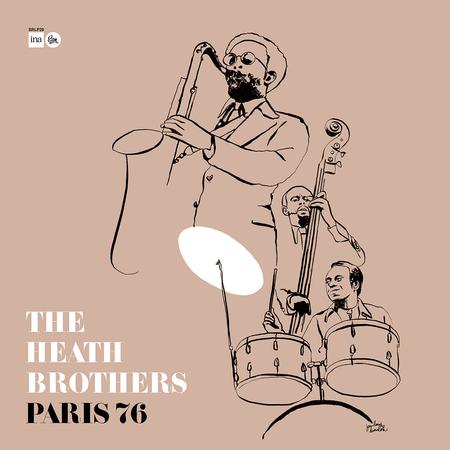The Heath Brothers plus Stanley Cowell Perform on French Radio Show "Jazz Vivant"
previously unreleased
The three Heath brothers, Jimmy, Percy and Albert formed their short-lived group in 1975 a year after The Modern Jazz Quartet gave its "final" performance at Carnegie Hall, November, 1974. Of course like many groups and solo artists, it wasn't really the MJQ's final performance and the group had been performing its "farewell" tour around the country all year, but for the time being following the Carnegie Hall appearance bassist Percy Heath was free to pursue work outside the group.
Percy had been playing in an ensemble with saxophonist brother Jimmy, but in 1975 The Heath Brothers, adding brother Albert "Tootie" Heath (still with us at 88) on drums, formed its family group in Philadelphia, adding Stanley Cowell—a classically trained pianist with a graduate degree from well, studied classical piano at Oberlin and received his graduate degree in same from the University of Michigan.
Cowell also co-founded the Strata-East record label in 1971. Strata-East released Marchin' On! the only record the three Heath brothers ever recorded (at least that I could find).
That makes this new Sam Records release, taken from a live performance the group performed for the French radio show "Jazz Vivant" all the more interesting and for fans of any or all of the brothers, that much more precious. It was recorded April 16th, 1976 at Studio 104, Maison de la Radio.
The set includes two tracks from Marchin' On!, "Watergate Blues" and "Smilin' Billy" as well as Jimmy Heath's "One For Juan", which first appeared on a 1967 Art Farmer Quintet record The Time And the Place, a supposed "live" album recorded at The Museum of Modern Art, with Heath on saxophone but that in reality was a studio recording with audience sounds dubbed in—not the first time Columbia engaged in such chicanery. Later, Mosaic Records' Michael Cuscuna found the actual live performance three track tape and released it as The Time and the Place: The Lost Concert but it does not include "One For Juan". The song also appears on Heath's 1973 album Love and Understanding.
The Sam Records website includes this excerpt from Jimmy Heath's autobiography I Walked With Giants, regarding the Marchin' On! album:
“That was the first Heath Brothers album. Stanley Cowell had started the Strata-East label with Charles Tolliver, and they engaged us to do a record. It was a family affair, and we adopted Stanley because we thought he was amazing. That was a different type of record for us. We recorded it while we were on tour in Oslo, Norway. We used to get on the train and travel around Europe, and we’d be playing in these cabins on the train. Percy played a bass with a cello body that Ray Brown created, Tootie and I played flutes, and Stanley played a chromatic African thumb piano. People would stop and listen to us on these trains going from one country to the next, and it was something that they liked. It was like a chamber-music group. So we decided to include that sound on the record”.
So, this album captures the three brothers with Cowell in Paris playing the three tunes about a year and a half before Albert left the band and it's a real treat especially for listeners used to hearing and seeing tuxedoed staid Percy in the MJQ here funking out on his composition "Watergate Blues". It's Percy Heath as you've never before heard him. The set opens with the tuneful Afro-Cuban "One For Juan", with Jimmy at one point playfully quoting a famous Coltrane riff and Cowell getting in a long intense solo. Albert gets in some hard hitting as well.
Percy has to wait for "Watergate Blues" to take center stage and when he does, he mimics a guitar, playing his "baby bass". It's so different from what you'd expect from Percy Heath, it's just too much fun—as is the entire track once the rest of the group joins in. The audience goes crazy.
Jimmy's mood changing "Smilin' Billy" takes up all of side two's 22 minutes. It begins with Heath's elegiac arco bass accompanied by Cowell's ghostly mbira and Heath's flute and builds from there into a swirling exotica meditation that takes flight when Cowell insistently thumbs the mbira well-captured by the recording. Albert's unsubtle pounding is occasionally a bit much where a lighter touch would be more helpful. As the tune rolls on Jimmy picks lips his soprano sax and moves the tune into meditative snake charmer territory and then into some harder blowing that takes the soprano and the tune itself into pretty deep places before the dramatic, muscular finale. When side two ends you'll know you've been somewhere special for forty five minutes.
The sound is seriously fine with the instruments all well-recorded and closely mic'd and mixed in wide-soundstage stereo. The high resolution digital transfer and restoration leaves nothing on the table in terms of spaciousness, overall transparency, instrumental three-dimensionality and macro dynamic slam—Albert's drum kit on the right channel discharges powerful sonic spasms and the reedy quality of Jimmy's soprano sax is on full textural display. Cowell's mbira is particularly well reproduced, especially the transient metallic "pluck" surrounded by lots of air.
Sam Records' excellent packaging consists of a fold-over jacket a thick poly-lined inner sleeve and a double panel black and white photo of The Heath Brothers, April 1976 by Thierry Trombert that also shows the microphone used and their placement, which helps explain the sonic immediacy.
The release is limited to 3000 copies. You won't regret picking one up for both the musical and sonic pleasure. And the packaging as well.














































